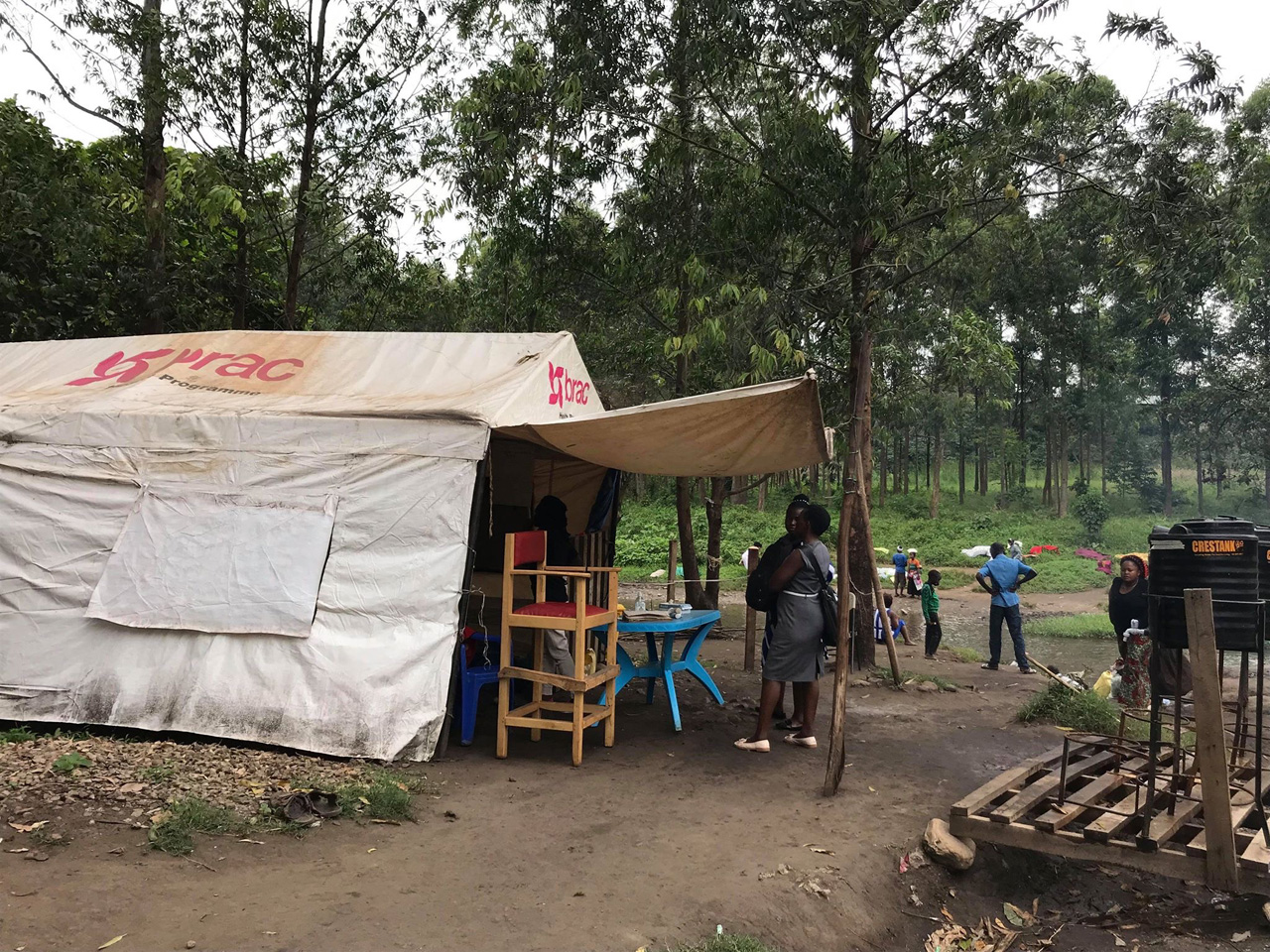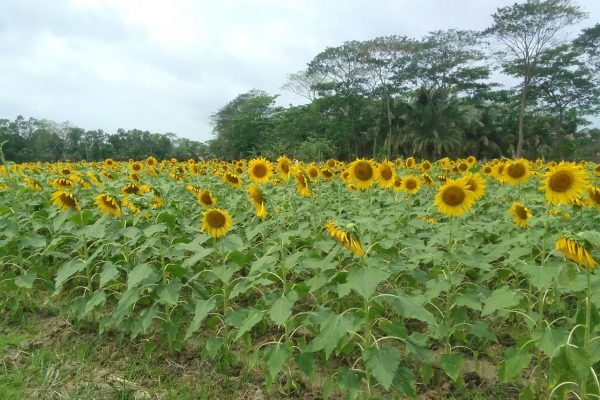BRAC’s lessons from Ebola for COVID-19: Focus on the community, support government and invest in people
Reading Time: 5 minutes
This series is a collection of insights from BRAC practitioners who have led responses to mass-scale crises across the world. We present key factors for other practitioners; healthcare professionals, governments and development authorities to consider in preparation, management, relief and recovery.
As the world finds itself in uncharted territory struggling to combat COVID-19 and its effects, BRAC’s work in Africa during the Ebola crisis offers valuable lessons for responding to public health crises in low-income countries.
Hasina Akhter was based in Uganda as BRAC’s country director during 2017-2019 and she led BRAC’s Ebola response in 2019.
“When faced with a massive public health crisis, organisations need to tackle the situation with three things in mind. The first of which is the importance of having a deep understanding of what is being said and thought at the community level.”
In Hasina’s experience, it starts with making sure that everyone, down to the community-level, has accurate information about the virus.
“The basic messaging was not too different [in Uganda] – people had to avoid mass gatherings, maintain social distance and increase hygiene measures such as hand washing. In many ways, compared to COVID-19, Ebola was deadly – it did not discriminate between the young and the old, and it was contracted through any bodily fluid. Information had to be disseminated to as many people as possible, as quickly as possible. It can only take one person to endanger an entire neighbourhood. The spread of contamination worsens through travel, so if communities are well informed, they will be less likely to travel, making it easier to contain it.”
Read more: COVID-19: Update from Asif Saleh (8 May 2020)
The importance of this has not escaped Bangladesh in the past. Investing in people at the community level has been key to many of Bangladesh’s major public health successes, such as tackling infant mortality through the oral rehydration solution and reducing the rates of tuberculosis. Studies in Bangladesh during COVID-19 however, show significant gaps in information at the community-level.
In parallel with sharing information, misinformation has to be dealt with.
For Uganda, this meant demystifying Ebola. There was a lot of panic and misconceptions during last year’s outbreak, and people believed the virus was being brought back by the fairer-skinned aid workers. Some called it witchcraft. A Médecins Sans Frontières worker was killed as the conspiracy spread.The same is being noticed in Bangladesh, where NGO workers are being suspected as carriers of COVID-19 and barred from entering communities.

The Ugandan government engaged community actors. Priests, imams and clan leaders were asked to disseminate information. They acted as local emissaries of the government, letting the citizens know what the virus really was.
Rumour-mongering has always been present in Bangladesh. This has dangerously accelerated during COVID-19. Hasina’s experience in Uganda demonstrates that tapping into influential locals is a key tactic for dealing with this.
Fear also prevents the uptake of information. That was seen in Uganda and is being seen here now in Bangladesh. In Uganda, when a family member was at risk, contact tracing was immediately carried out. The extent of transmission was mapped and less panic could spread. It was still a challenge though. People were quarantined for 21 days, and that was perceived to be punishment.
Read more: Let’s not forget people with disabilities during this pandemic
Stigma was attached to being infected with Ebola, similar to what is seen now with COVID-19 patients. Incidents of people running away from quarantine were reported, something being mirrored in Bangladesh. Panic can be deadly, leading people to think only about self-preservation. A woman suffering from fever, cough and breathing difficulties was left abandoned by family members in a forest at Bangladesh’s Tangail last month.
Again, non-state actors, specifically religious leaders, played a vital role in destigmatising both the Ebola virus and quarantine. People were made to understand that the quarantine period was for their benefit. They were educated on what the virus was, how it spread and that there was no need to abandon loved ones just because they were infected.
Community engagement spanned across all walks of life. A focus was put on featuring people that communities looked up to and could relate to, such as star football players. All of the community engagement focused on one central message – asking people not to panic.
The community responded better to government directives, as they could see the state narrative aligned with their own localised ones.
The media played an active role. Radio stations blared government bulletins and newspapers ran daily features. Numbers were constantly updated, awareness constantly spread and people were reassured because they had knowledge. At one point, the health minister even met the king of Uganda, Rukidi IV of Tororo Kingdom, and enlisted his help to spread the message. He emphasised on overcoming fear, inspiring confidence in the government and stymying panic. The engagement was scaled in a way so as to involve as many actors as possible, and Ugandans heeded the government’s warnings and advice.
“In our office, we made sure people did not shake hands. When people came to the office, the security guards would ensure they washed their hands.” Hasina says.
New patterns of behaviour were not easy, but eventually people adjusted to them. People remembered how bad the outbreak was in 2013 and no one wanted a repeat of that.
The second lesson was for organisations to support the work of the government.
“Partnership is essential in a crisis – efforts need to be synergised. We signed an MoU with the Ugandan government at the beginning,” Hasina recalls.

Hasina says organisations need to step up and assess the resources they have, how they can contribute best, and how they can strengthen the efforts of others – particularly bigger actors. When a mass-level intervention is needed, mass-level resources and thinking is needed, and governments can implement nationwide measures which are beyond the purview of anyone else – such as closing borders.
“The Ugandan government deployed a robust and holistic approach as soon as the first case of Ebola surfaced. The country was immediately put on red alert, with borders heavily patrolled.”
The funeral process during Ebola was technical and required skilled people. As people went back to their villages for the burial, the religious leaders, clan chiefs, NGOs and government representatives delegated responsibilities to each person. When masks, sanitisers and other supplies ran low, government procurement efforts were slow – so NGOs took it on, using existing stock and sourcing more. BRAC also stepped in to ensure border quarantine facilities, setting up tents, rooms and beds with the government’s support.
Read more: How BRAC is supporting Bangladesh to continue education in a pandemic
Bangladesh continues to see a huge number of organisations and individuals responding to COVID-19. This is extremely positive, but is also leading to duplication and people in the most vulnerable situations being left out. One of the initiatives BRAC has taken in an effort to tackle this has been a map of urban slums and relief across Bangladesh. This is informing efforts and improving coordination, and should hopefully lead to more collaborative efforts in similar crises in future.
The third lesson was to invest in people.
While many of us reading this are safely quarantined at home, millions of frontline staff around the world do not have that luxury.
Hasina stressed that staff and volunteers who bear high risk of exposure not only need equipment to protect their safety, but they also need support to protect motivation. Organisations need to respond to their dedication.
“In Uganda, our frontline staff were provided hardship and risk allowance, not only as an incentive, but also as a sign that their efforts were appreciated. I believe it was one of the major elements in motivating staff in that crucial period, and immensely helped in staff retention during the crisis,” Hasina recalls.
There were areas in Uganda where for hundreds of kilometres, no healthcare infrastructure could be seen, except for BRAC health workers. Empowering them helped deal with the Ebola virus at a much faster rate.
Training and retraining is also important when dealing with a novel virus – misinformation is rampant. BRAC in Uganda ensured fortnightly staff training, to solidify measures to prevent and protect. These helped the staff to retain accurate information, and curb panic and confusion.
COVID-19 is continuing to affect the entire world, and people who were already living in vulnerable situations prior to the virus are paying the highest price for measures such as economic lockdowns. Tackling the virus requires a collective effort from the whole world, and the knowledge we already have is a powerful tool. Focusing on the community, working in synergy with national efforts and investing people on the frontlines can go a long way, if there is something to be learned from the past.
Luba Khalili is Deputy Manager at BRAC Communications. Sarah-Jane Saltmarsh is Head, Programme and Enterprise Communications.





